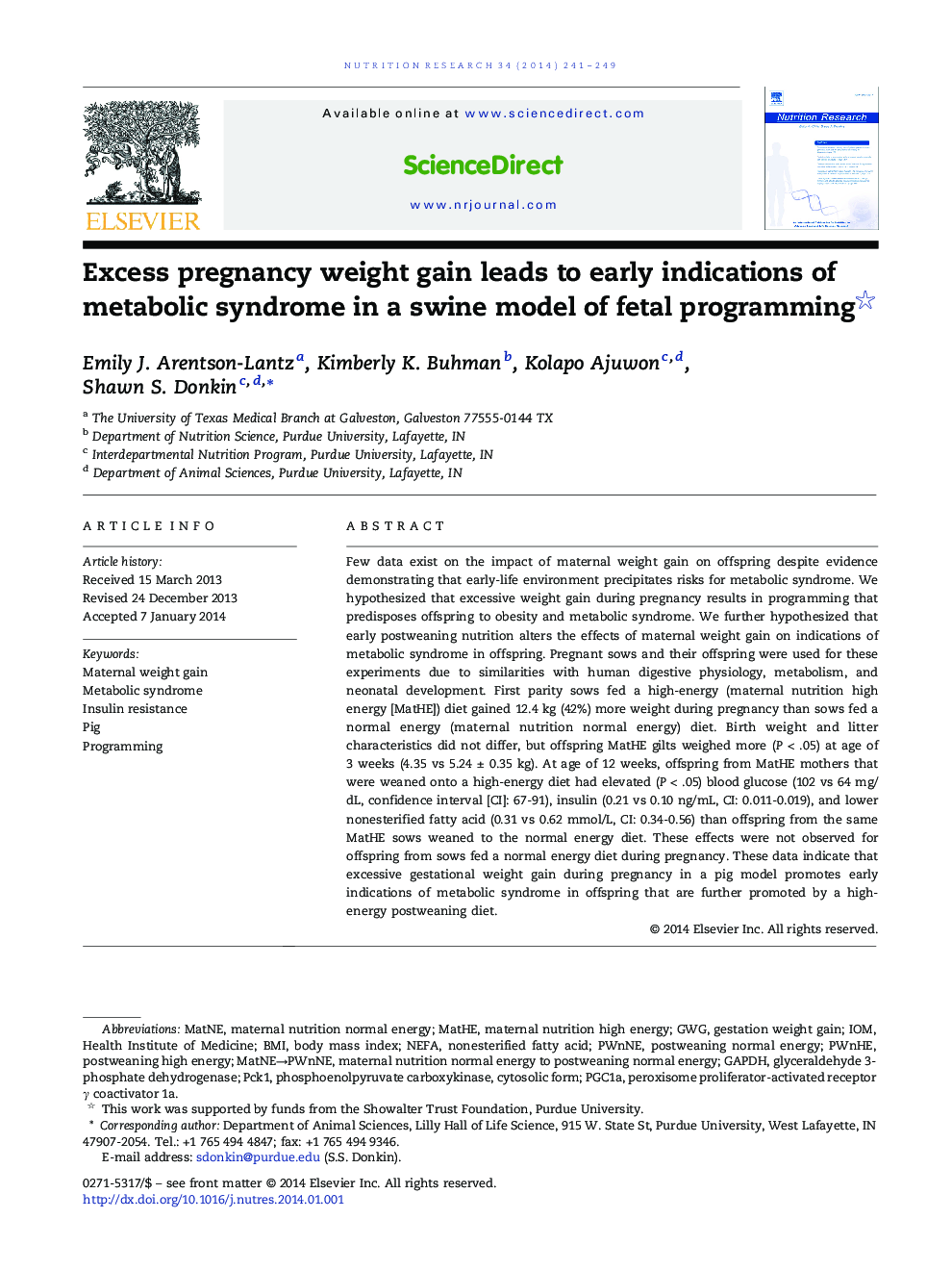| کد مقاله | کد نشریه | سال انتشار | مقاله انگلیسی | نسخه تمام متن |
|---|---|---|---|---|
| 5904453 | 1158000 | 2014 | 9 صفحه PDF | دانلود رایگان |
عنوان انگلیسی مقاله ISI
Excess pregnancy weight gain leads to early indications of metabolic syndrome in a swine model of fetal programming
ترجمه فارسی عنوان
اضافه وزن در دوران بارداری منجر به نشانه های اولیه سندرم متابولیک در یک مدل خوکی برنامه نویسی جنین می شود
دانلود مقاله + سفارش ترجمه
دانلود مقاله ISI انگلیسی
رایگان برای ایرانیان
کلمات کلیدی
GAPDHGWGIOMNEFAPCK1PGC1anonesterified fatty acid - اسید چرب غیراسترین شدهMaternal weight gain - افزایش وزن مادرانProgramming - برنامه نویسی یا برنامه ریزیPig - خوکMetabolic syndrome - سندرم متابولیکbody mass index - شاخص توده بدنBMI - شاخص توده بدنیInsulin resistance - مقاومت به انسولینglyceraldehyde 3-phosphate dehydrogenase - گلیسرولیدید 3-فسفات دهیدروژناز
موضوعات مرتبط
علوم زیستی و بیوفناوری
بیوشیمی، ژنتیک و زیست شناسی مولکولی
علوم غدد
چکیده انگلیسی
Few data exist on the impact of maternal weight gain on offspring despite evidence demonstrating that early-life environment precipitates risks for metabolic syndrome. We hypothesized that excessive weight gain during pregnancy results in programming that predisposes offspring to obesity and metabolic syndrome. We further hypothesized that early postweaning nutrition alters the effects of maternal weight gain on indications of metabolic syndrome in offspring. Pregnant sows and their offspring were used for these experiments due to similarities with human digestive physiology, metabolism, and neonatal development. First parity sows fed a high-energy (maternal nutrition high energy [MatHE]) diet gained 12.4 kg (42%) more weight during pregnancy than sows fed a normal energy (maternal nutrition normal energy) diet. Birth weight and litter characteristics did not differ, but offspring MatHE gilts weighed more (P < .05) at age of 3 weeks (4.35 vs 5.24 ± 0.35 kg). At age of 12 weeks, offspring from MatHE mothers that were weaned onto a high-energy diet had elevated (P < .05) blood glucose (102 vs 64 mg/dL, confidence interval [CI]: 67-91), insulin (0.21 vs 0.10 ng/mL, CI: 0.011-0.019), and lower nonesterified fatty acid (0.31 vs 0.62 mmol/L, CI: 0.34-0.56) than offspring from the same MatHE sows weaned to the normal energy diet. These effects were not observed for offspring from sows fed a normal energy diet during pregnancy. These data indicate that excessive gestational weight gain during pregnancy in a pig model promotes early indications of metabolic syndrome in offspring that are further promoted by a high-energy postweaning diet.
ناشر
Database: Elsevier - ScienceDirect (ساینس دایرکت)
Journal: Nutrition Research - Volume 34, Issue 3, March 2014, Pages 241-249
Journal: Nutrition Research - Volume 34, Issue 3, March 2014, Pages 241-249
نویسندگان
Emily J. Arentson-Lantz, Kimberly K. Buhman, Kolapo Ajuwon, Shawn S. Donkin,
